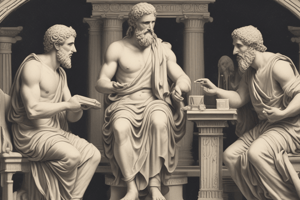Podcast
Questions and Answers
According to Euthyphro, what is his first definition of piety?
According to Euthyphro, what is his first definition of piety?
- Doing what the gods deem to be just, like castrating one's father
- Contradicting the beliefs of one's family members
- Refraining from accusing one's own father of a crime
- Prosecuting a wrongdoer, even if they are a family member (correct)
What is the key complaint that Socrates makes about Euthyphro's first definition of piety?
What is the key complaint that Socrates makes about Euthyphro's first definition of piety?
- Socrates thought Euthyphro's definition contradicted the idea that the gods are the best and most just
- Socrates believed Euthyphro's definition was too specific and not general enough
- Socrates argued that Euthyphro's definition relied on the divine example of Zeus, which was itself impious
- Socrates wanted a definition of piety, not an example of it (correct)
What is Euthyphro's second definition of piety?
What is Euthyphro's second definition of piety?
- Contradicting the beliefs of one's family members
- Prosecuting a wrongdoer, even if they are a family member
- Doing what is dear to the gods (correct)
- Refraining from accusing one's own father of a crime
What is the key complaint that Socrates makes about Euthyphro's second definition of piety?
What is the key complaint that Socrates makes about Euthyphro's second definition of piety?
According to the passage, which of the following is true about Euthyphro's prosecution of his own father?
According to the passage, which of the following is true about Euthyphro's prosecution of his own father?
What is the significance of the 'Argument by divine example' mentioned in the passage?
What is the significance of the 'Argument by divine example' mentioned in the passage?




